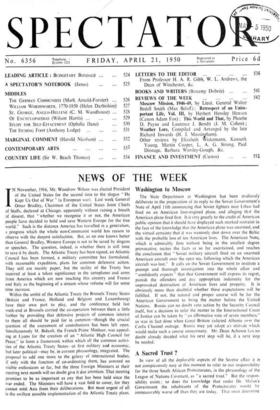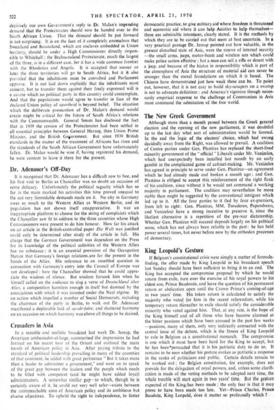A Sacred Trust ?
In view of all the deplorable aspects of the Seretse affair it is not conspicuously easy at this moment to refer to our responsibility for the three South African Protectorates, in the phraseology of the League of Nations Covenant, as "a sacred trust." But the respon- sibility exists ; so does the knowledge that under Dr. Malan's Government the inhabitants of the Protectorates would be immeasurably worse off than they are today. That must determine decisively our own Government's reply to Dr. Malan's impending demand that the Protectorates should now be handed over to the South African Union. That the demand should be put forward is not surprising. It is on the face of it completely anomalous that Swaziland and Basutoland, which are enclaves embedded in Union territory, should be under a High Commissioner directly respon- sible to Whitehall ; the Bechuanaland Protectorate, much the largest of the three, is in a different case, for it has a wide common frontier with the Rhodesias and Angola. It is accepted that sooner or later the three territories will go to South Africa, but it it also provided that the inhabitants must be consulted and Parliament approve. It is not laid down explicitly that the inhabitants must consent, but to transfer them against their freely expressed will is a course which no political party in this country could contemplate. And that the populations would agree to transfer in face of the declared Union policy of apartheid is beyond belief. The situation which the deliberate prosecution of Dr. Malan's demand would create might be critical for the future of South Africa's relations with the Commonwealth. General Smuts has disclosed the fact that in 1939 the cession of the Protectorates had been settled in all essential principles between General Herzog, then Union Prime Minister, and the British Givernment. But since 1939 British standards in the matter of the treatment of Africans has risen and the standards of the South African Government have unfortunately fallen. Dr. Malan would be wise if, having registered his demand, he were content to leave it there for the present.







































